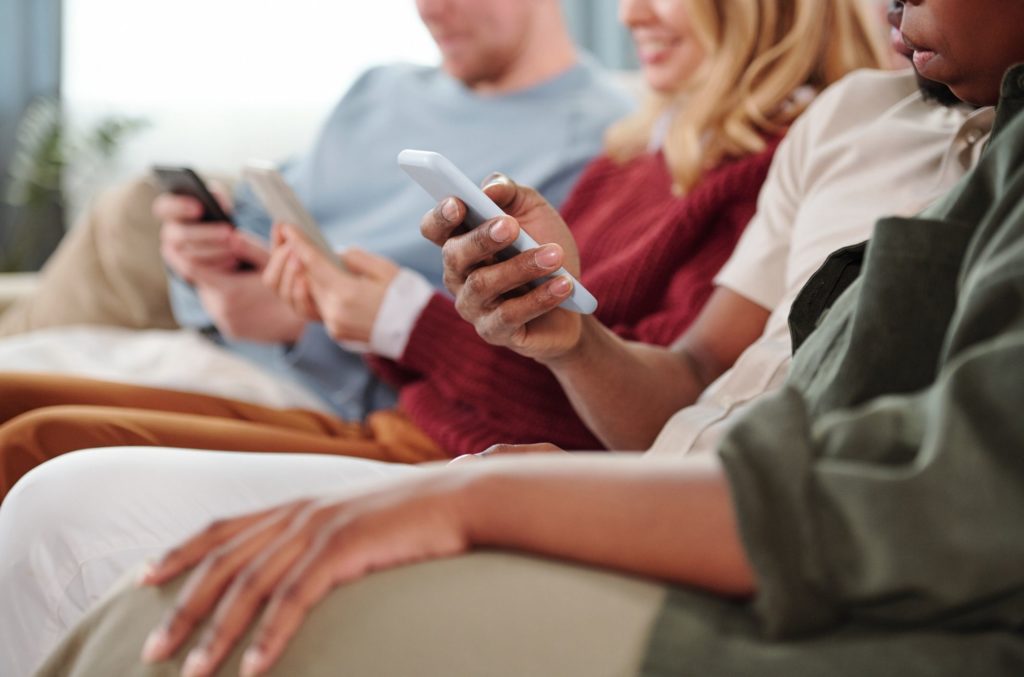Since they became available in the 1990s, smartphones have dramatically changed the world. While these devices are multipurpose in design, research shows that most Americans have some sort of social media profile, making it the most popular smartphone activity. Let’s look at the pros and cons of social media and its impact on mental health.
Since they became available in the 1990s, smartphones have dramatically changed the world. While these devices are multipurpose in design, research shows that most Americans have some sort of social media profile, making it the most popular smartphone activity. Let’s look at the pros and cons of social media and its impact on mental health.
The effects of social media
If you happen to be one of the few who don’t subscribe to any social media platforms, your life is still affected. Social media is present in nearly every aspect of daily life, whether it be travel, leisure, dating, news, politics, or religion.
While some may sing the praises of social media, referencing thousands of followers as an indicator of their social connectivity, others see social media as a destructive force, blaming it for the country’s social division.
In the last few years, people have become more aware of the duality of social media. While social media isn’t all good or all bad, it certainly isn’t neutral.
Depending upon how you use it, social media can be a life-enhancing tool or a source of emotional distress.
The reality is that research on the effects of social media is still in its infancy, but there’s enough anecdotal evidence to draw some convincing hypotheses. Let’s check out the pros and cons of social media.
Benefits of social media
Yes, social media certainly has its benefits. Here are 4 compelling pros of social media—ways that can positively impact your life.
Connection
In its original conception, most social media creators purport that its primary function is to bring people together and build community. Now you can easily stay connected with old friends, classmates, and family members.
You don’t have to wait for your high school reunion to find out what happened to the graduating class of ‘05. Also, you can meet new people who share similar ideas, values, or identities that you may never have had the opportunity to encounter otherwise.
This can be especially valuable if you feel isolated or alone because your identity or values aren’t represented or prioritized in the place you live.
Expression
Social media has revolutionized creative expression, giving new opportunities to share and distribute art of all mediums. Visual artists, musicians, dancers, and other creatives aren’t dependent upon wealthy financiers to build their audience.
This allows for more diverse and inclusive expressions in every type of creative pursuit. Also, social media has opened up space for people of all ideologies to gather and share thoughts. If you can imagine a topic, there’s an online community for it.
Raise awareness
In a similar vein, social media has sparked social change by raising awareness and giving voice to disenfranchised populations. The # has become a new communication phenomenon, helping fuel and launch prominent movements like #MeToo and #BlackLivesMatter.
Throughout the pandemic, social media has played a significant role in pointing out disparities that contributed to the disproportionate effect of COVID in communities of color.
Disseminate and consume information
Social media allows for the exponential spread of news and information in real-time. You can follow a story as it unfolds at any time of day and from multiple perspectives. With eyewitness accounts, you’re no longer dependent upon newspaper and television networks as the sole proprietor of a story.
Negative effects of social media
But social media also has a problematic impact. Many of the attributes that make it so appealing also lead to adverse effects. Recent research shows a connection between social media use and mental health issues.
Multiple studies in the United States, Turkey, the United Kingdom, and China have found that the more exposure you have to social media, the more likely you are to experience:
- Anxiety
- Depression
- Social phobia
- Low self-esteem
- Narcissism
- Insomnia and other sleep disturbances
While there isn’t sufficient evidence to prove that social media is the direct cause of these mental health issues, there is enough knowledge about human nature and anecdotal evidence to pose some hypothetical correlations. Below are some negatives of social media—reasons why using social media may contribute to mental health concerns.
Disconnection and Isolation
Social media allows you to find other like-minded individuals to share ideas, memes, photos, and videos. But this might be at the expense of real face-to-face interactions. Studies have shown that in-person interactions among teenagers are down1 to 2 hours per day on average—when compared with previous generations. In contrast, their time spent on digital devices has grown to an average of 7.5 hours per day.
The issue is that humans are relational beings. From an early age, most humans learn to communicate using non-verbal expressions, as well as learning how to interpret these signals from others.
Communicating with texts and DMs means that we no longer get access to these cornerstones of face-to-face meetings. This includes eye contact, facial expression, and physical gestures.
“Likes” and prompts lead to a false sense of connection due to their superficial quality. Authentic connections rely upon trust, loyalty, empathy, and the ability to work through conflict. Because we might not have as much access to these types of relationships, we may start to lose some of the interdimensional, fulfilling aspects of personal connections.
Loss of Civility
The ability to post anonymously on social media platforms allows people to voice things they might otherwise be scared to say. While this can be empowering for some, it opens the door for cyberbullying and harassment.
Surveys show that 42% of high school students report experiencing offensive name-calling online, while 55% of adults have experienced online hate due to their political beliefs.
Online debates, particularly about politics, quickly turn hostile as people are more inclined to say things they wouldn’t say face-to-face. It’s harder to cultivate empathy without eye contact, facial expression, and vocal tone. If someone angers you or contradicts your beliefs, you can easily cut them out of your life by “unfriending” them.
Plus, inflammatory comments are not easy to forget because they exist indefinitely online. Unless deleted, they remain available to revisit and rehash at any time.
Compare and despair
As you scroll through pictures and videos on social media, you may get caught by the comparison trap—the sense that everyone but you is leading their best life. Since people highlight only their most impressive moments, pictures are filtered and photoshopped, and content is carefully curated.
While you lay on your couch mindlessly scrolling, you might be filled with an overwhelming sense of FOMO (fear of missing out). It may not be the direct cause of depression, but social media can undoubtedly contribute to depressive symptoms such as guilt, shame, and hopelessness.
Self-worth becomes contingent upon designer clothing, exotic travel, six-pack abs, and conventional beauty standards. These were always at the center of media and marketing campaigns. But now, even your “friends” seem to be leading adventure-filled lives of beauty and luxury while you lay on your couch.
Narcissism
What started as platforms for sharing content have evolved into sources of validation. For many, the number of “likes” becomes an external measure of self-worth. The number of followers collected is celebrated with the prize title of “influencer.” This person has the power to shape the buying habits of their followers.
But does the number of “likes” really equate to genuine connection? A large following can give the illusion of popularity. But the reality is that it lacks the depth of an emotionally intimate relationship, which requires trust, vulnerability, and conflict resolution skills.
Information overload
Before smartphones and social media, people generally consumed their news via newspaper or television in contained blocks of time. With the advent of smartphones and social media, people have become inundated with non-stop anxiety-producing information.
Push notifications are constantly pulling for attention, and algorithms fill news feeds with antagonistic or controversial content. Research shows hostile posts garner more hits, which means more money for the social media platform.
In recent years, it’s become public knowledge that social media sites profit from information about their users. It’s understandable to feel a sense of paranoia when you realize your data is being mined and exploited for profit. This information may leave you wondering whether privacy still exists or has become a thing of the past.
Loss of truth
Given the rise of political extremism and conspiracy theories, people are paying more attention to the dangerous failure of content moderation. False ideas are spread at an exponential rate, while misinformation and disinformation make it challenging to discern the truth.
The advent of deep fake technology, artificial intelligence that makes it possible to create compelling audio, video, and photographic forgeries, may eventually make it nearly impossible to discern reality. If we can’t agree on truth and reality, how will we sustain democracy and the other foundational ideologies of our country?
Division
Information, advertising, and feeds are curated for you by algorithms based on your past searches and online behaviors. This creates a filter bubble that keeps you from experiencing a true diversity of ideas and experiences. This contributes to tribalism and separatism.
Decreased sleep
Where’s your phone when you sleep? Research shows that teens are losing sleep because they are up at night using social media and sleep with a phone in their hands or under their pillow. Phone and social media use is one common cause of insomnia and other sleep disturbances. Adequate sleep is necessary for physical and mental well-being.
Is social media good or bad?
Now that you’ve learned some social media pros and cons, you may be wondering whether social media is a good thing or a bad one. Like so many other human behaviors, our relationship with social media is complex and nuanced.
Since there are both positive and negative effects of social media, it isn’t a phenomenon we can call all good or bad. That being said, there are certain things you can do to have a healthier relationship with your cell phone.
If you’re experiencing mental or emotional distress as a result of social media, here are some things to try:
- Limit the amount of time you spend on social media. Try scheduling just 30 minutes in the morning or evening.
- Take one day a week off from social media.
- Turn off push notifications.
- Refrain from online debates and arguments.
- Hold important conversations face-to-face.
- Put your phone away in social situations.
- To the best of your ability, stop comparing yourself to others on social media. Try unfollowing or even blocking profiles of people who make you feel envious or inadequate.
Takeaway
- There are both pros and cons of social media.
- It’s a valuable tool for building connections and sharing ideas, but it can become a source of emotional distress and conflict without mindful use.
- Limiting time on social media leads to improved mental health and well-being.
- Reap the positive effects of social media by using social platforms as tools to cultivate personal relationships, not replace them.
- Personal, face-to-face relationships based on trust, vulnerability, and authenticity are key ingredients to happiness, fulfillment, and well-being.












